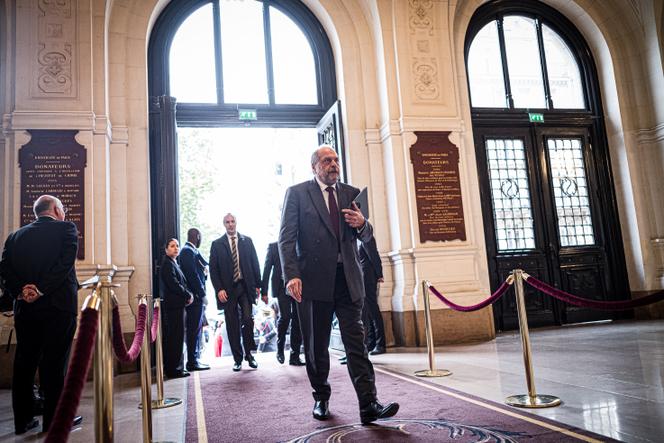


It promises to be a solemn occasion: Justice Minister Eric Dupond-Moretti's trial is due to open on Monday, November 6, before the Court of Justice of the Republic (CJR). For the first time, a sitting minister will appear before the court's judges, for a 10-day hearing, facing accusations of conflicts of interest. The justice minister is suspected of having sought revenge against four magistrates with whom he had run-ins as a lawyer.
The CJR is a special jurisdiction: It is the court that judges crimes and misdemeanors committed by members of the government in the exercice of their duties. It is made up of three magistrates from the Cour de cassation and 12 members of Parliament, six from the Assemblée Nationale and six from the Sénat, elected by their peers. There is regular talk of reforming this court, but that would require a constitutional amendment.
The prosecution will be led by France's highest-ranking prosecutor, Rémy Heitz, appointed on July 2 by President Emmanuel Maron, and by prosecutor Philippe Lagauche, who has followed the entire investigation. Every party is walking on eggshells: Heitz, though legally independent, is set to bring accusations against his own minister, while attempting not to betray his predecessor. Of the 22 witnesses called forward by the prosecution, many work or have worked for the Justice Ministry.
Dupond-Moretti is also risking a lot: If he is convicted, he could face up to five years' imprisonment, a €500,000 fine and he will be forced to leave government, as confirmed by Prime Minister Elisabeth Borne. During the trial, however, he intends to continue exercising his office, and will simply be excused from the Council of Ministers. He is being defended by two lawyers, Rémi Lorrain, a partner at the Maisonneuve law firm, and Jacqueline Laffont, one of former French president Nicolas Sarkozy's lawyers.
The justice minister is accused of having used his office to settle scores with magistrates against whom he had previously had run-ins with as a lawyer. The CJR's investigating committee found that he should have "refrained from knowing the situation of magistrates whose actions he had criticized as a lawyer, especially as he has the power to appoint and sanction them." The committee accused him of conflicts of interest in two separate cases, having ignored several warnings from his staff, magistrates' unions and the French High Authority for Transparency in Public Life.
The first case concerns the dismissal from Monaco of an investigating judge, Edouard Levrault, who was scrutinizing the Russian businessman Dmitri Rybolovlev and the director of the local judicial police. For two weeks, Dupond-Moretti acted as the police official's lawyer, but above all as counsel to two of the Russian billionaire's companies in the British Virgin Islands. In June 2020, Levrault took part in a television program criticizing the functioning of Monaco's judiciary. Dupond-Moretti vigorously denounced the judge's "cowboy" methods and announced that he was going to file a complaint.
You have 60% of this article left to read. The rest is for subscribers only.
